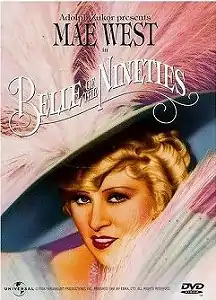Belle of the Nineties
Belle of the Nineties is a 1934 American film directed by Leo McCarey and released by Paramount Pictures. Mae West's fourth motion picture, it was based on her original story It Ain't No Sin, which was also to be the film's title until censors objected. Johnny Mack Brown, Duke Ellington, and Katherine DeMille are also in the cast. The film is noted for being the premiere performance of the jazz standard "My Old Flame", performed by West with the Duke Ellington orchestra.
| Belle of the Nineties | |
|---|---|
 | |
| Directed by | Leo McCarey |
| Produced by | William LeBaron |
| Written by | Mae West |
| Music by | Arthur Johnston |
| Cinematography | Karl Struss |
| Edited by | LeRoy Stone |
Production company | Paramount Pictures |
| Distributed by | Paramount Pictures |
Release date |
|
Running time | 75 minutes |
| Language | English |
| Budget | $800,000 (estimated)[1] |
| Box office | $1,300,000 (rentals)[2] |
Cast
- Mae West as Ruby Carter
- Roger Pryor as Tiger Kid
- Johnny Mack Brown as Brooks Claybourne (as John Mack Brown)
- Katherine DeMille as Molly Brant
- John Miljan as Ace Lamont (owner, Sensation House)
- Duke Ellington as Piano player (Sensation House)
- James Donlan as Kirby
- Stuart Holmes as Dirk
- Harry Woods as Slade
- Edward Gargan as Stogie
- Libby Taylor as Jasmine
- Warren Hymer as St. Louis Fighter
- Benny Baker as Blackie
- Morrie Cohan as Butch
- Tyler Brooke as Comedian
- Tom Herbert as Gilbert
- Eddie Borden as Comedian
- Fuzzy Knight as Comedian
- Gene Austin as St. Louis Crooner
- Blue Washington as Doorman (uncredited)
Production
Shooting commenced on March 19, 1934, and concluded in June. The film was released on September 21, 1934. It had a domestic (U.S.) gross of $2,000,000. As usual with West's films, some scenes were removed for versions to be shown in different states. To be shown in New York, one of the biggest markets, they had to completely re-shoot the final scene.[3] Mae West's character and the Tiger Kid were originally to complete their nuptials without a marriage ceremony; the ceremony had to be included.[4]
The male lead was supposed to be played by George Raft, but he refused.[5] His part was taken by Roger Pryor, a stage actor.[6] Filmink said "this was Raft's first truly dumb movie choice – there were to be plenty more."[7]
Music
A publicity stunt went awry when 50 parrots were trained to shout the original title of "It Ain't No Sin". The parrots were subsequently released in the jungles of South America, still repeating "it ain't no sin" over and over again.[8] Sheet music of the song "My American Beauty" was also printed with the film's original title, and corrected with a rubber stamp. The film is noted in the jazz world for being the release of the song "My Old Flame", composed by Arthur Johnston with lyrics by Sam Coslow. It is sung by Mae West in the film, backed by the Duke Ellington Orchestra and went on to become a jazz standard.[9] Johnston and Coslow also wrote the songs "My American Beauty", "When a St. Louis Woman Comes Down to New Orleans", and "Troubled Waters" for the film,[4] which also features "The Memphis Blues" and "At Sundown".
Reception
The film was a box office disappointment for Paramount upon release in September 1934,[10] but it received some positive reviews from critics, with Andre Sennwald of The New York Times describing the Johnston and Coslow songs as "quite perfect", and stating that the film was "bolstered by a smart and funny script, an excellent physical production and a generally buoyant comic spirit". He added that "There are gags for every taste and most of them are outrageously funny according to almost any standard of humor".[4]
References
- "Box office / business for Belle of the Nineties". IMDb. Retrieved 2009-06-20.
- "All-Time Film Rental Champs". Variety. October 15, 1990. p. M150.
- Tuska, Jon (1975). The Films of Mae West. Secaucus: Citadel Press. p. 92. ISBN 0-8065-0502-8.
- Sennwald, Andre (22 September 1934). "Mae West and Her Gaudy Retinue in "Belle of the Nineties" -- "Chu Chin Chow" at the Roxy". The New York Times. Retrieved 25 May 2020.
- Schallert, E. (Feb 5, 1934). ""Frances Drake and Jean Muir, Younger Recruits, Being Groomed for Bright Stardom."". Los Angeles Times. ProQuest 163134511.
- "George Raft Refuses Part In Mae West Film". The West Australian. 50 (9, 936). Western Australia. 4 May 1934. p. 3. Retrieved 27 July 2017 – via National Library of Australia.
- Vagg, Stephen (February 9, 2020). "Why Stars Stop Being Stars: George Raft". Filmink.
- A Woman at War: Marlene Dietrich Remembered, p. 28, at Google Books
- "My Old Flame". Jazzstandards.com. Retrieved 24 May 2020.
- D. W. (Nov 25, 1934). "Taking a Look at the Record". New York Times. ProQuest 101193306.
External links
- Belle of the Nineties at IMDb
- Synopsis at AllMovie
- Belle of the Nineties at the TCM Movie Database
- Stills at pre-code.com